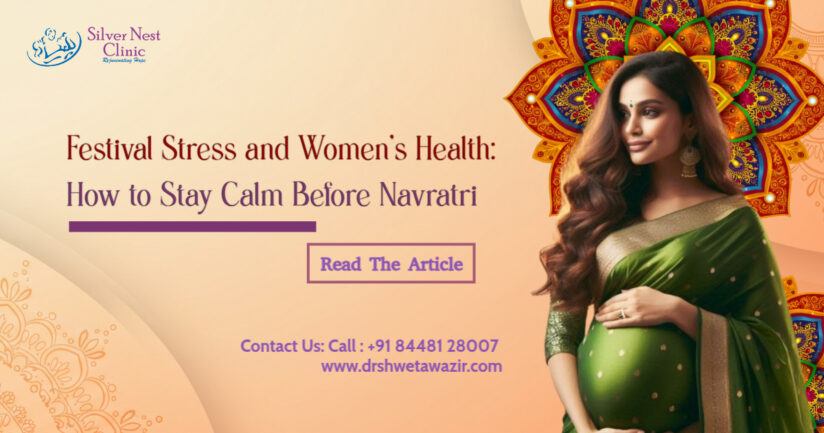Navratri is one of the most cherished festivals in India, filled with devotion, prayers, fasting, and cultural celebrations. It brings families together and fills homes with positivity, but for many women, it also adds responsibilities, expectations, and physical strain. This combination can lead to festival stress, a condition that impacts both mental and physical health.
For women, especially those managing work, household duties, and sometimes pregnancy, the stress of Navratri preparations can feel overwhelming. Recognising these challenges and adopting simple, mindful strategies can make the festive season healthier and more joyful.
Understanding Festival Stress
Festival stress refers to the physical, mental, and emotional strain that arises during the preparation and celebration of festivals. It is often caused by:
- Increased household work such as cooking, cleaning, and decorating.
- Managing cultural and family expectations.
- Financial pressures from shopping and gifts.
- Fasting or changes in diet that disrupt usual eating patterns.
- Lack of adequate rest and sleep due to rituals, puja, and late-night events.
Common Symptoms of Festival Stress in Women
- Fatigue and low energy
- Anxiety, irritability, or mood swings
- Disturbed sleep patterns
- Headaches, muscle tension, or stomach discomfort
- Difficulty concentrating and feeling emotionally drained
Impact of Festival Stress on Women’s Health
1. Mental Health
Women often carry the larger share of festive responsibilities, leading to higher stress levels. Chronic stress increases the risk of anxiety, depression, and emotional exhaustion.
2. Physical Health
Prolonged stress can raise blood pressure, disturb heart rhythm, lower immunity, and worsen digestive problems. Women may experience menstrual irregularities, migraines, or chronic fatigue during stressful festive periods.
3. Pregnancy and Reproductive Health
For women who are pregnant, stress takes on greater importance. Prenatal stress is linked with fatigue, high blood pressure, and in some cases, complications such as preterm labor or low birth weight. Managing stress is therefore vital not just for the mother but also for the developing baby.
Practical Strategies to Stay Calm Before Navratri
1. Plan Ahead and Prioritize
- Prepare a checklist of tasks and spread them across days.
- Focus on what truly matters, spiritual connection and family bonding.
- Delegate responsibilities to family members instead of doing everything yourself.
2. Maintain Sleep Hygiene
- Aim for 7–8 hours of quality sleep whenever possible.
- Limit late-night screen time and caffeine.
- Use short naps to recover energy if festival rituals extend late into the night.
3. Balanced Nutrition and Hydration
- If fasting, start with a wholesome pre-fast meal that includes complex carbohydrates, protein, and healthy fats.
- Break the fast with light, easy-to-digest foods such as fruits, yogurt, or nuts before moving to heavier meals.
- Stay hydrated with water, coconut water, or buttermilk; avoid excessive caffeine and sugary drinks.
4. Stress-Relief Practices
- Practice deep breathing exercises or meditation for 10–15 minutes daily.
- Include light physical activity such as yoga, stretching, or walking.
- Journaling or expressing gratitude helps in shifting focus from stress to positivity.
- Spiritual practices like prayer, chanting, or devotional music can bring peace of mind.
5. Emotional Support and Boundaries
- Communicate openly with family about your capacity and limits.
- Avoid comparing your celebrations with others, social pressure often worsens stress.
- Seek help if you feel emotionally drained; even a short conversation with a friend or counselor can make a difference.
Festival Stress and Pregnancy: Extra Care Needed
Pregnant women need additional care during Navratri due to fasting, physical demands, and disrupted sleep. Tips include:
- Avoid long fasting hours, opt for small, frequent meals when possible.
- Focus on iron, calcium, folic acid, and protein intake.
- Take prenatal vitamins as prescribed by your doctor.
- Rest frequently and avoid heavy lifting or overexertion.
- Pay attention to warning signs such as extreme fatigue, dizziness, or reduced fetal movement, these require immediate medical attention.
Lifestyle Practices for Long-Term Resilience
Managing festival stress is easier when women build resilience year-round. Healthy habits make the body and mind better equipped to handle additional responsibilities during festive times.
- Exercise regularly: Yoga, walking, or light workouts.
- Eat a balanced diet: Ensure daily intake of fruits, vegetables, protein, and healthy fats.
- Practice mindfulness: Regular meditation improves emotional stability.
- Stay socially connected: Supportive relationships act as a strong stress buffer.
- Limit stimulants: Reduce caffeine, packaged foods, and processed snacks.
When to Seek Professional Help
It’s important to consult a doctor if:
- Stress feels unmanageable and persistent.
- Anxiety, sadness, or irritability interferes with daily life.
- You notice severe physical symptoms such as persistent headaches, palpitations, or extreme fatigue.
- If pregnant, you experience reduced fetal movement, high blood pressure, or unusual pain during festival days.
Professional guidance ensures both physical safety and emotional well-being.
How Dr. Shweta Bansal Wazir Can Help
At her clinic in Gurgaon, Dr. Shweta Bansal Wazir provides comprehensive care for women, addressing both physical and emotional aspects of health. She offers:
- Personalised counselling to manage festival stress.
- Nutritional guidance for fasting and non-fasting women.
- Pregnancy care with trimester-specific advice.
- Stress management techniques tailored to Indian women balancing cultural expectations.
With her expertise, women can celebrate Navratri without compromising health or peace of mind.
Conclusion
Navratri is a festival of devotion, energy, and joy. But for women, the added responsibilities can sometimes overshadow the celebrations, leading to stress. By recognising the signs of festival stress, prioritising self-care, and seeking professional support when needed, women can stay calm, balanced, and healthy.
This Navratri, celebrate with serenity. Protect your well-being, honor your traditions, and keep your health at the centre of your festive journey.
📍 Visit: www.drshwetawazir.com
📞 Call: +91 84481 28007


Leave A Comment